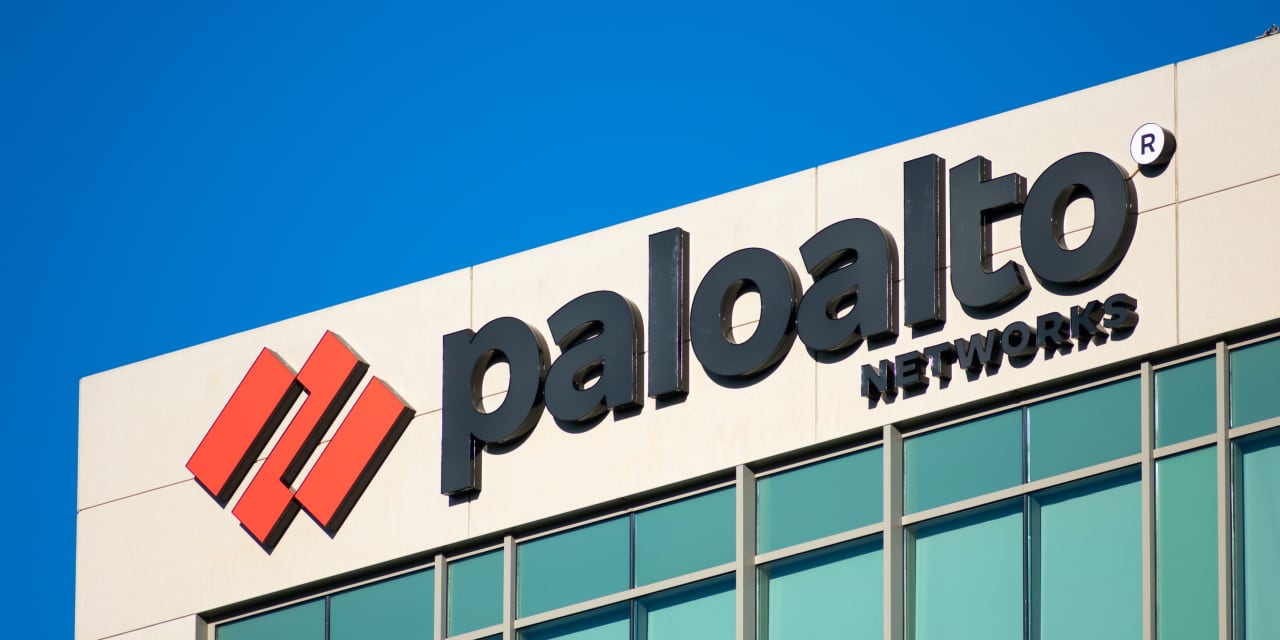Shares of security software stocks are getting hammered on Wednesday after industry leader Palo Alto Networks provided disappointing financial guidance—and warned about some disturbing corporate spending trends on security software.
Shares were down 26% to $271.61 when the market opened Wednesday, on track for the largest percent decrease on record. Shares of rival
Zscaler
were down 15%, the biggest drop since 2022., while
Fortinet
stock was off 6%, and
CrowdStrike
stock was 11% lower.
Palo Alto late Tuesday reported January-quarter revenue of $2 billion, slightly ahead of the FactSet consensus estimate for $1.97 billion, with adjusted profits of $1.46 a share, ahead of the Street estimate for $1.30. But billings in the quarter were slightly below Street estimates, and the company reduced billings and revenue guidance for the fiscal year ending July 2024.
The company said it has been seeing weakness from the government sector, and pointed to a sluggish firewalls business.
But the biggest issue for both Palo Alto Networks and for its rivals were comments on the company’s earnings conference call from CEO Nikesh Arora about spending trends.
“We’re beginning to notice customers are facing spending fatigue in cybersecurity,” Arora said. “This is new, as adding incremental point products is not necessarily driving a better security outcome for them. This is driving a greater focus on ROI and total cost of ownership amongst most customers.”
Added Arora: “Our customers are sitting down and saying, ‘If I spend more money, can you show me how I get a lower total cost of ownership across my enterprise? How do I spend less on the services that I have to deploy? And how do I get better ROI?’ So I think it’s more about optimizing their current cybersecurity budgets as opposed to there being no demand. Demand continues to be very strong. The customers are demanding to get more for the amount of money they have allocated to cybersecurity.”
He also said that some competitors are engaging in “rogue behavior by some vendors in the space who are keen to retain their customers, primarily in the legacy vendor space and the start-up space.”
The notion of “optimizing” security spend will send chills up the spine of investors—the comment is reminiscent of a recent trend in the cloud-computing sector that resulted is a dramatic slowdown in growth.
Arora said the worse-than-expected outlook wasn’t because of softer demand, but that it was part of a strategy shift toward becoming more of a platform. Arora mentioned forging ahead with artificial intelligence.
Guggenheim analyst John DiFucci noted that the results were disappointing, and kept his Neutral rating. Yi Fu Lee at Cantor Fitzgerald reduced his price target to $350 from $400 but maintained an Overweight rating.
Evercore ISI analyst Peter Levine expressed confidence in the company, maintaining an Outperform rating with a price target of $405.
“There is no demand problem, no underlying shift in the fundamentals, and no new emerging competitive concerns,” Levine wrote. “With no apparent demand deficit, we believe management has enough credibility to instill some confidence in their choice to sacrifice short-term revenue to pursue a strategic shift.”
Write to Brian Swint at brian.swint@barrons.com and Eric J. Savitz at eric.savitz@barrons.com
Read the full article here










Leave a Reply